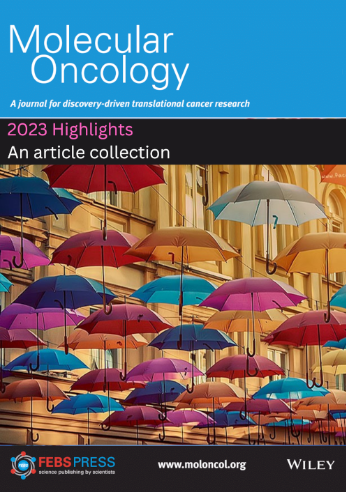Prostate cancer disease recurrence after radical prostatectomy is associated with HLA type and local cytomegalovirus immunity
IF 5
2区 医学
Q1 ONCOLOGY
引用次数: 6
Abstract
Prostate cancer is a heterogeneous disease with a need for new prognostic biomarkers. Human leukocyte antigen (HLA) genes are highly polymorphic genes central to antigen presentation to T‐cells. Two alleles, HLA‐A*02:01 and HLA‐A*24:02, have been associated with prognosis in patients diagnosed with de novo metastatic prostate cancer. We leveraged the next‐generation sequenced cohorts CPC‐GENE and TCGA‐PRAD to examine HLA alleles, antiviral T‐cell receptors and prostate cancer disease recurrence after prostatectomy. Carrying HLA‐A*02:01 (111/229; 48% of patients) was independently associated with disease recurrence in patients with low‐intermediate risk prostate cancer. HLA‐A*11 (carried by 42/441; 10% of patients) was independently associated with rapid disease recurrence in patients with high‐risk prostate cancer. Moreover, HLA‐A*02:01 carriers in which anti‐cytomegalovirus T‐cell receptors (CMV‐TCR) were identified in tumors (13/144; 10% of all patients in the cohort) had a higher risk of disease recurrence than CMV‐TCR‐negative patients. These findings suggest that HLA‐type and CMV immunity may be valuable biomarkers for prostate cancer progression.根治性前列腺切除术后前列腺癌复发与HLA类型和局部巨细胞病毒免疫有关
前列腺癌是一种异质性疾病,需要新的预后生物标志物。人类白细胞抗原(HLA)基因是高度多态性的基因,对抗原呈递到T细胞至关重要。HLA‐A*02:01和HLA‐A*24:02两个等位基因与新发转移性前列腺癌患者的预后相关。我们利用下一代测序队列CPC - GENE和TCGA - PRAD来检测HLA等位基因、抗病毒T细胞受体和前列腺切除术后前列腺癌疾病复发。携带HLA‐A*02:01 (111/229);48%的患者)与低-中危前列腺癌患者的疾病复发独立相关。HLA‐A*11(42/441携带);10%的患者)与高风险前列腺癌患者的快速疾病复发独立相关。此外,在肿瘤中发现了具有抗巨细胞病毒T细胞受体(CMV - TCR)的HLA - A*02:01携带者(13/144;该队列中所有患者(10%)的疾病复发风险高于CMV - TCR阴性患者。这些发现表明,HLA -型和巨细胞病毒免疫可能是前列腺癌进展的有价值的生物标志物。
本文章由计算机程序翻译,如有差异,请以英文原文为准。
求助全文
约1分钟内获得全文
求助全文
来源期刊

Molecular Oncology
医学-肿瘤学
CiteScore
12.60
自引率
1.50%
发文量
203
审稿时长
6-12 weeks
期刊介绍:
Molecular Oncology highlights new discoveries, approaches, and technical developments, in basic, clinical and discovery-driven translational cancer research. It publishes research articles, reviews (by invitation only), and timely science policy articles.
The journal is now fully Open Access with all articles published over the past 10 years freely available.
 求助内容:
求助内容: 应助结果提醒方式:
应助结果提醒方式:


